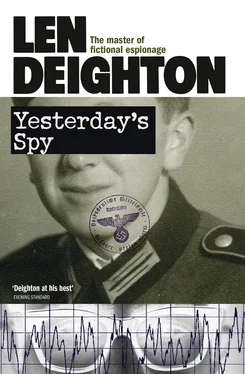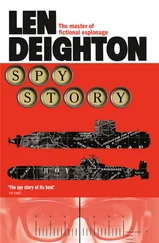‘Sub-machineguns,’ I said.
‘Go to the top of the class.’
‘But could you get the Long cartridge?’
‘Am I glad you weren’t involved, old boy! No, you couldn’t get them. But the kids who bought them were too young to remember the MAS 38, so they think they are MAT 49s, for which there is 9 mm stuff ready to be nicked from a local police or army unit. Right?’
‘Right.’
‘But I’m getting ahead of the story. Imagine me – the only man in Accra who’d sooner have Renault spares than sub-machineguns, sitting on ten cases of them. All of them customs cleared, rubber stamped and signed for. It was tempting.’
‘But you didn’t succumb?’
‘Oh, but I did.’ He took a drag on his cigarette and waved the smoke away. ‘Two hundred and thirty-five dollars each – American dollars – and I could have doubled it, had I sold them to the loudmouths with the fuzzy-wuzzy haircuts.’
‘Ten to a case?’ I said. ‘About ten thousand pounds profit.’
‘I had to stop my client going down to the customs and raising hell about his Renault spares. I owed a bit of money, I had to get an exit permit, and clearance from the tax office: it all costs money.’
‘You came home?’
‘I went to buy my air ticket from a crooked little Portuguese travel agent. I started bargaining with him, knowing that he could unload my US dollar bills at a big premium. To cut a long story short, I ended up giving him all my American money in exchange for a bag of uncut diamonds from Angola and a boat ticket to Marseille.’
‘You went to Marseille?’
‘Old man Tix had just died, his whole set-up was for sale. Caty’s sister told me about it. But the Algerian fighting was still on, and the Tix fruit and vegetable importing was no more than a ream of headed notepaper and a couple of fleabitten offices in Constantine.’
‘And the quarry was defunct.’
‘The quarry – yes.’ Champion smiled. We’d both hidden in the quarry during a big German round-up, when old man Tix had chased a German officer out of the house shouting ‘Sale Boche’ at him, crossing himself as he did so. ‘The quarry was finished. They’d mined, too, but it was costing so much to dig that the old boy did better on unemployment benefit.’
‘But you sold your diamonds and bought the Tix place from his widow?’
‘That was only a down payment,’ said Steve, ‘but Madame Tix wanted me to have it. She waited a long time for the rest of the money. It was a gamble for all concerned. We were betting on a peaceful settlement of the Algerian war.’
‘You were always a good guesser, Steve,’ I said.
‘The peace between France and Algeria meant immigrant labourers – that got the mine back into profit.’
‘Lower wages,’ I said.
‘But still higher than any they could get in their own country.’
‘But you closed the mine and the quarry – you sent the men home.’
Champion smiled. He said, ‘It was the idea of cheap labour in the mine. That’s what enabled me to get my capital. Avaricious little hairdressers with their hands in the till … contractors fiddling their tax, and hard-eyed old bastards from the merchant banks. They came to see my quarry and the Arabs sweating their guts out. They liked it – that was the kind of investment those little sods could understand. That was the way their grandfathers – and their friends’ grandfathers – had made a fortune in Africa a hundred years ago.’
‘And you put that money into the fruit and veg.’
‘Much more than money … soil analysis, a professor of botany, a programme of seeding techniques, long-term contracts for the farmers, minimum price guarantees for seasonal workers, refrigerated warehouses, refrigerated transport and contracted refrigerated shipping. I put a lot of money into the Arab countries.’
‘And now they have oil as well.’
‘Oil is a one-crop economy,’ said Champion.
‘A gilt-edged one,’ I said.
‘That’s what they said about coffee and tea and rubber,’ said Champion. ‘I truly believe that North Africa must trade with Europe, right across the board. The Arab countries must have a stake in Europe’s well-being. The economics must link, otherwise Africa will let Europe die of inflation.’
‘I never thought of you as a crusader, Steve.’
Champion seemed disconcerted at the idea. He picked up his glass to hide behind it.
Two men came downstairs: one was a famous poet, the other a peer of the realm. They were arguing quietly and eruditely about the lyrics of an obscene Eighth Army song about the extra-marital activities of King Farouk.
A club servant came to tell Champion that a lady was waiting at the entrance. ‘Come along,’ said Champion. ‘This is someone I’d like you to meet.’
A servant helped Champion into the lightweight vicuna coat, designed like a British warm, and handed him the bowler hat that made him look like a retired general. Someone unseen gave a perfunctory brush to the shoulder of my dirty raincoat.
The snow obliterated the view through the doorway, like static on an old TV. Outside in St James’s Street, London’s traffic was jammed tight. Champion’s girl gave no more than the nod and smile that manners demanded. Her eyes were devoted to Champion. She watched him with the kind of awe with which an orphan eyes a Christmas tree. It was always the same girl. This one had the same perfect skin that Caty had, and the same soft eyes with which Pina had looked at him. Except that decades had passed since Caty or Pina had been this kid’s age.
‘Melodie,’ said Champion. ‘It’s a nice name, isn’t it: Melodie Page.’
‘It’s a lovely name,’ I said, in my usual sycophantic way.
Champion looked at his watch. ‘It’s a long time since we jawed so much,’ he told me. ‘My God, but you would have been bored, Melodie. We must be getting old.’ He smiled. ‘Melodie and Billy are taking me to the theatre tonight. They are going to repair one of the gaps in my musical education.’
The girl hit his arm in mock anger.
‘Rock music and pirates,’ Champion told me.
‘A potent mixture,’ I said.
‘Billy will be glad I’ve seen you. You always remember his birthday, he told me.’
‘Yes,’ I said.
‘That’s damned nice of you.’ Champion patted my arm.
At that moment, exactly on schedule, a black Daimler drew level with the entrance. A uniformed driver hurried across the pavement, opening an umbrella to shelter Champion and the girl from the weather. He opened the door, too. As the girl slid into the real leather seating, Champion looked back to where I was standing. The snow was beating about my ears. Champion raised his gloved hand in a regal salute. But when only three of your fingers are able to wave, such a gesture can look awfully like a very rude Anglo-Saxon sign.
I could see my report about Champion on Schlegel’s desk. Schlegel picked it up. He shook it gently, as if hoping that some new information might drop out of it. ‘No,’ said Schlegel. ‘No. No. No.’
I said nothing. Colonel Schlegel, US Marine Corps (Air Wing), Retired, cut a dapper figure in a lightweight houndstooth three-piece, fake club-tie and button-down cotton shirt. It was the kind of outfit they sell in those Los Angeles shops that have bow windows and plastic Tudor beams. He tapped my report. ‘Maybe you can shaft the rest of them with your inscrutable sarcasm and innocent questions, but me no likee – got it?’
‘Look,’ I said. ‘Champion was just seeing his kid, and buying stamps – there’s no other angle. He’s a rich man now: he’s not playing secret agents. Believe me, Colonel. There’s nothing there.’
Читать дальше












